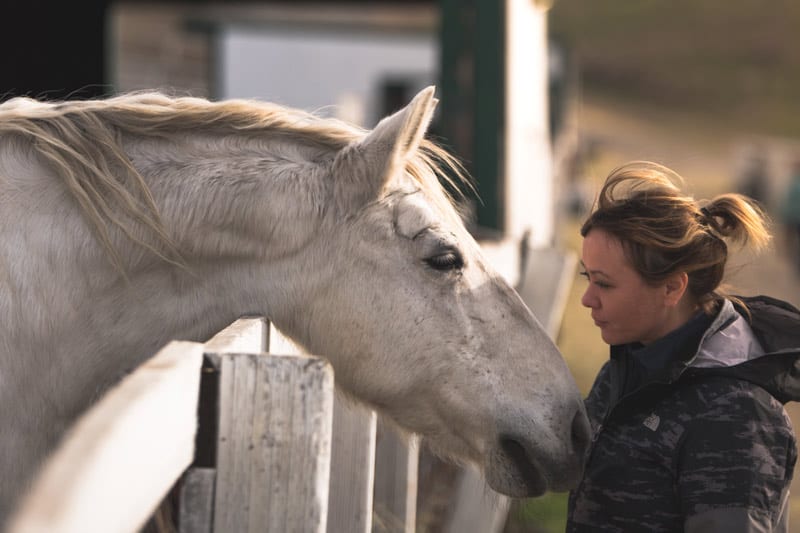Horse lovers around the world will agree that spending time with these beautiful, intelligent animals is both fun and therapeutic. Teenage equine therapy, or horse therapy for teens, uses this beneficial interaction to teach adolescents valuable life skills and improve mental health. If your daughter is interested in equine therapy, there are programs that are focused exclusively on girls.
What Is Teenage Equine Therapy?
During teenage equine therapy, teens are given opportunities to help care for horses under the supervision of a therapist. This creates a safe and trusting environment and combines animal companionship with daily responsibilities that benefit both your daughter and the horse. When the girls become responsible for all the tasks that keep the horse healthy and happy, such as grooming and feeding, their self-esteem improves, along with many other desirable traits.
Equine therapy is not simply implementing regular exposure to horses and helping with their care. This is not a program that is run by a recreational facility or other broad organization. Equine therapy is carefully designed and carried out by trained and certified psychotherapists and other medical professionals, such as physical therapists. This provides the best possible outcomes and enables staff to consistently monitor and implement strategies that are specific to your child.
Benefits of Teenage Equine Therapy for Girls
Teenage girl therapy using horses has numerous physical, mental, and emotional benefits. Often, the use of horses in this manner will help your daughter open up and be more receptive to therapy, even when other methods have failed in the past. A few of the many benefits are mentioned below to illustrate the impact equine therapy can have on adolescents who participate in this type of program.
- Increased empathy and compassion
- Self-discipline and impulse control
- Social/emotional awareness
- Physical awareness
- Ability to bond and build trusting relationships
- Increased self-esteem
- Improved patience
- Increased ability to handle stressful situations
- Ability to honor commitments and follow through on responsibilities
- Improved problem-solving skills
Who Can Benefit from Teenage Equine Therapy?
Anyone experiencing a difficult period in her life or who has a long-term condition can benefit from this type of teenage girl therapy. Your daughter’s overall quality of life can be improved in a variety of medical, social, and psychological conditions:
- Depression
- Anxiety
- ADHD
- Down Syndrome
- Autism
- Reactive Attachment Disorder (RAD)
- PTSD
- Developmental Delay
- And more
Keep in mind that through the improvement of your child’s well-being, your entire family will likely be positively affected, especially if you are actively involved in the process.
Understanding Why It Works
Horses are naturally sensitive to emotions, both from other horses and from humans. This is particularly true when it comes to a person attempting to ride, groom, or closely interact with them in any way. For example, if a teen has come to equine therapy to address anger issues, she may approach the horse with feelings of anger and frustration. The horse, in turn, will resist and back away, struggling to trust that it is in a safe environment. It is only when the human and the horse feel mutually safe that a bond can be created.
While working to care for horses during therapy, the teen will need to confidently employ patience, self-discipline, and problem-solving strategies to complete her tasks. Over time, this will help her develop many valuable life skills that can be used to manage stress, mental health, and more. She will also develop physical strength and learn the value of hard work.
If you or someone you know experiences mental health issues, it is important to seek help from a qualified professional. Our Resource Specialist can help you find expert mental health resources to recover in your community. Contact us now for more information on this free service to our users.
About the Author: Maria Abellan is the Head Content Strategist for Renewed Hope Ranch. She is also the author of How Group Therapy Helps Young Girls. She has a background in writing for email marketing and blogging campaigns.
July Is BIPOC Mental Health Month
In 2008 the United States government designated July as Bebe Moore Campbell National Minority Mental Health Awareness Month “to enhance public awareness of mental illness …. among minorities.”
Bebe Moore Campbell was an American author and mental health advocate who wrote works of fiction, nonfiction, and children’s literature about the harmful effects of racism and the mental health impacts on those affected.
Each July, www.rtor.org and its sponsor Laurel House, Inc. honor the legacy of Bebe Moore Campbell. We believe in using language that puts people first and emphasizes their individuality and unique contributions rather than their health or demographic status. Just as we do not refer to people living with schizophrenia as “schizophrenics,” we avoid terms such as “minority” and “marginalized” when referring to BIPOC (Black, Indigenous, and People of Color) and BIPOC Mental Health Month.
Please join us in recognizing the unique struggles BIPOC face and bringing awareness to the need for adequate, accessible, culturally relevant mental health treatment, care, and services.
Our recent blog post, 8 Accessible Mental Health Resources for Black, Indigenous, and People of Color (BIPOC), contains several links to online resources promoting the emotional wellbeing and access to mental health care for these communities.
www.rtor.org and Laurel House are committed to the advancement of racial equity and social justice and to making mental health services available to all.
Photo by Casey Horner on Unsplash
The opinions and views expressed in any guest blog post do not necessarily reflect those of www.rtor.org or its sponsor, Laurel House, Inc. The author and www.rtor.org have no affiliations with any products or services mentioned in the article or linked to therein. Guest Authors may have affiliations to products mentioned or linked to in their author bios.
Recommended for You
- How Arguments Can Heal Attachment Wounds: A Therapist’s Guide to Turning Relationship Conflict Into Deeper Connection - February 2, 2026
- Family Advocacy After Detox: A Guide to Supporting Your Loved One’s Recovery - January 29, 2026
- The Connection Between Trauma and Eating Disorders - January 26, 2026





